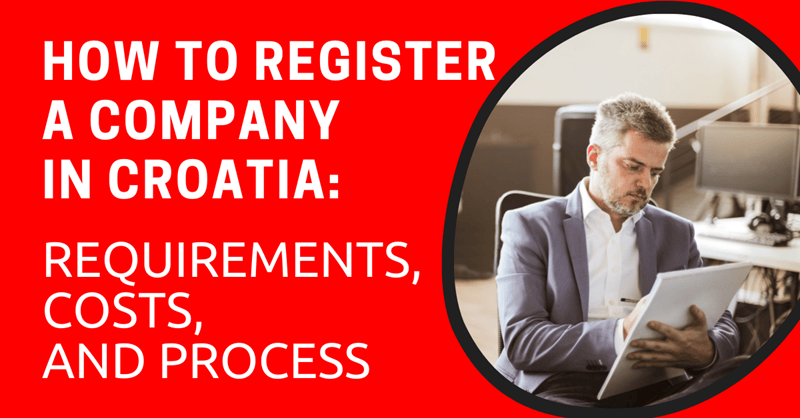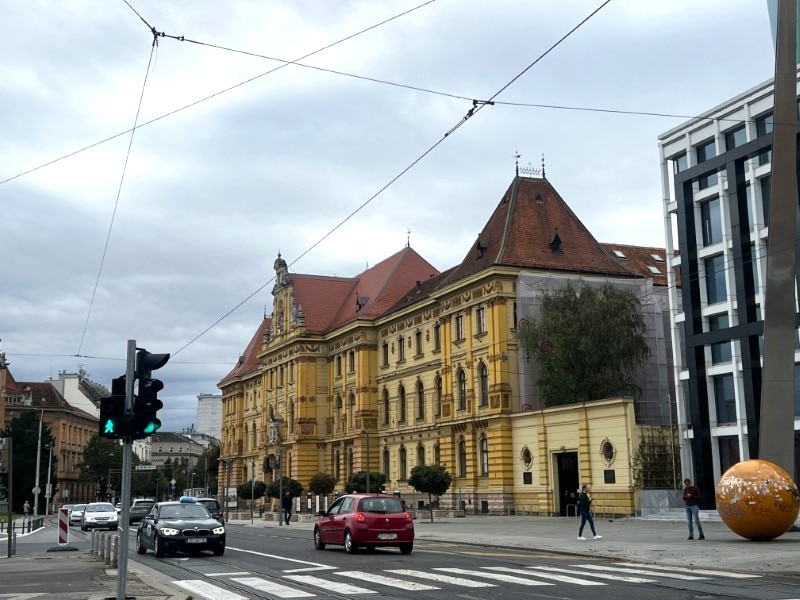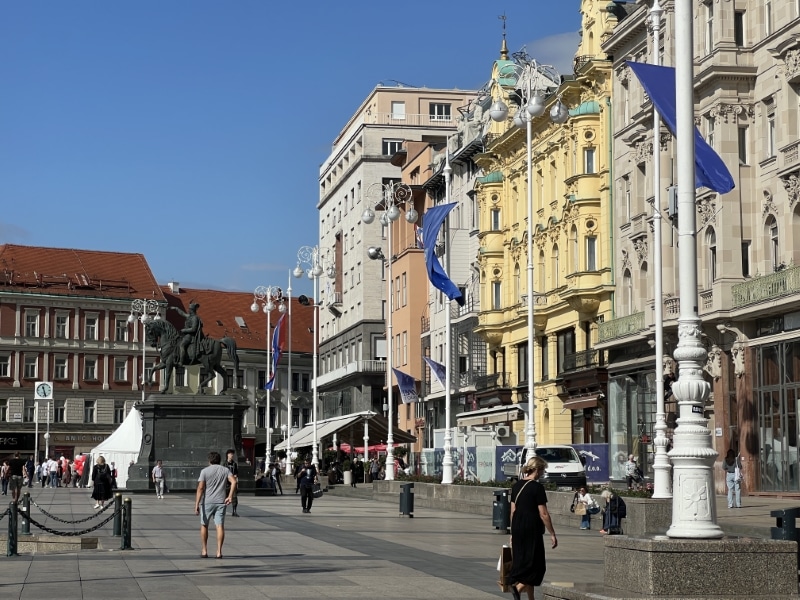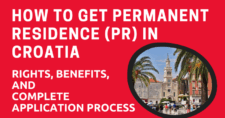
This article will take approximately 48 minutes to read. Don't have the time right now? No worries. Email the ad-free version of the article to yourself and read it later!
A guide to registering a company in Croatia, covering requirements, processes, costs, and documents needed for foreign investors.
When I was living in Split, I often walked past a little café by the harbor that welcomed tourists for only half the year, from spring to the end of summer, and then closed for the whole winter. This allowed the owners to travel, relax, or return to spend time with their families back home. That experience taught me what truly defines a ‘dream job‘. It’s about working in the true European style: working diligently for 6 months and then using the other 6 months to recharge. It gives you time to rethink your business plans or even travel around Europe at a leisurely pace.
But that’s not all, this country is also one of the emerging markets to watch in Europe. It offers lower business operating costs compared to other EU countries, together with its coastal location and large ports that provide easy access to central European markets. The tax system is favorable for entrepreneurs, and the tourism sector has been steadily growing over the past 10 years. Therefore, it’s no surprise that foreign investors are beginning to look to Croatia as a business base for entering the European market, in areas ranging from hotels, restaurants, and tourism services, to tech businesses.
For this reason, Croatia is not just a tourist destination; it’s also a promising spot for investment and business, especially for those seeking a true balance between work and life.
Disclaimer: This article may include links to products or services offered by ExpatDen's partners, which give us commissions when you click on them. Although this may influence how they appear in the text, we only recommend solutions that we would use in your situation. Read more in our Advertising Disclosure.
Contents
- Why is Croatia an Attractive Place for Business?
- Recommended Businesses in Croatia
- What Businesses Should You Avoid Starting in Croatia?
- How Much Investment Do You Need to Be Ready to Start a Business?
- Step-by-step guide to registering a company in Croatia
- Applying for a Business Visa to Conduct Business in Croatia
- d.o.o. (Limited Liability Company) or j.d.o.o. (Simple Limited Liability Company): Which is Better?
- Other Registration Types
- Documents for Company Registration
- Steps to Open a Corporate Bank Account in Croatia
- Steps to Obtain a Business License in Croatia
- Managing Taxes in Croatia for Expat Businesses
- Legal Insights and Tips for Expats Starting a Business in Croatia
- How is Property Ownership for Expat Businesses?
- Accounting Office: Legal Requirements for Doing Business in Croatia
- Lawyers
- Challenges for Expats in Croatia
- Recommended Business Locations
- Essential Resources and Tools for Entrepreneurs in Croatia
- Who Should Consider Doing Business in Croatia?
Why is Croatia an Attractive Place for Business?
Croatia offers an easy-going European charm similar to the popular series Emily In Paris, where the American character is surprised by the slow-paced lifestyle, sipping coffee leisurely, working moderately, and fully relaxing before starting each day. Meanwhile, it maintains a high quality of life with comprehensive infrastructure, including healthcare, transportation, and digital systems that support fast online work, rivaling that of Thailand.

Especially after joining the European Union, Croatia has essentially opened the door to a large market of over 450 million Europeans. Goods transportation is convenient by sea, air, and road, while the laws are clear, uncomplicated, and conducive to international trade. It’s no surprise that Croatia has become a target destination for investors and new entrepreneurs.
And there’s still prime real estate situated along key tourist sea routes, making it easy to connect Western and Eastern Europe. Tourist cities like Split, Dubrovnik, and Zagreb are brimming with business opportunities including boutique hotels, restaurants, cafes, and experiential tourism activities, attracting numerous investors every year. According to a survey by the Institute for Migration Research (Dec 2024 – Jan 2025), the expat community in Croatia is continually growing with many investors, restaurant owners, online entrepreneurs, and freelancers settling in. About 136,000 expats are working in Croatia, with 55% planning to bring their families, 19% intending to settle permanently, and over 30% planning to stay at least 5 more years.
Moreover, Croatia is a hot spot for Digital Nomads, with reports indicating that more than 5,000 people arrive every month, averaging around a 2-month stay. This is equivalent to having over 10,000 freelancers revolving in the country every month. This shows that the country not only attracts tourists but also people choosing it as a temporary base for work and life, turning it into a hub for entrepreneurs and freelancers from around the world.
One of the things that makes Croatia stand out in Europe, and something many expats dream about, is the chance to work almost like you’re on a school calendar. You work hard for six months, then take the next six off, all in sync with the seasons.
When I was living there, summer was full-on. Tourists poured in, cruise ships pulled up to the port almost every day, and the whole place buzzed with energy. On top of that, Croatia hosts Ultra Europe in Split, one of the biggest EDM festivals in the world. During that season, it wasn’t unusual to make around €3,000 to €5,000 (US$3,250 to US$5,450) a day.
But once October rolled around, winter storms moved in, the streets went quiet, and most locals stayed indoors. For me, it was the perfect time to hit the road. I traveled around Europe: Germany, Belgium, the Netherlands, Austria, and a bunch of other nearby cities. That downtime felt like a reset, a chance to recharge before jumping back into the madness of summer.
The advantage of working or doing business this way is having the time to organize your thoughts, start planning new projects, or think about improving your business without the pressure all year round. Plus, the cost of living is especially low during the winter, while the quality of life compares to major cities in Germany but with a lower crime rate. This is a major reason Croatia is becoming a booming investment destination and a dream city for young people who want to start a business.
Recommended Businesses in Croatia
For me, businesses related to tourism are quite interesting because Croatia is a favorite destination for Europeans. Additionally, businesses targeting digital nomads or retirees are also appealing. However, it’s clear that everyone has their own unique business perspective.
Restaurants and Cafes
If you take a stroll along the beach in Split during summer, you’ll see plenty of tourists sipping coffee or alcohol at seaside spots to escape the heat. Many places are so busy that bookings are required in advance. I quickly understood why many Europeans choose to open “restaurants and cafes” here. The potential to earn is high with a steady flow of international customers throughout the day.

When I handled marketing for a Thai restaurant, there was hardly anything I needed to do. Every table was full, and the staff was busy every day because of its prime location near the pier, beach, and old town. There was no need to worry about attracting customers. As long as nature remains beautiful and the city maintains low crime rates, tourism-related industries will continue to offer attractive investment opportunities. According to the Croatian Bureau of Statistics 2024, Croatia’s tourism industry accounts for over 24% of GDP, and the demand for restaurant, accommodation, and tour services continues to grow each year.
Residential Rental Businesses
Another business that’s really worth looking into in Croatia is the rental market. Prices for accommodation fluctuate a lot depending on the season, just like I mentioned in a previous article. Long-term rentals, especially houses available year-round, are actually pretty hard to find. Most property owners focus on short-term summer rentals since they can earn way more during those months. If you do manage to find a longer lease, it’s usually only in the winter off-season.
The income from rentals is solid, and managing the business isn’t all that complicated. Almost all of my Croatian friends have some kind of rental property on the side. Some already have repeat guests who come back every summer without them needing to promote anything. Others list on Airbnb or Booking.com and end up fully booked anyway. It’s basically steady income without too much hassle.
And it’s not just personal experience. According to the Croatian Bureau of Statistics, in 2024 the Istria region saw over 27.9 million overnight stays, followed by the Split-Dalmatia region with 18.3 million. Those numbers show just how profitable the rental business, whether it’s hostels, apartments, or private stays, can be, especially in Croatia’s most popular tourist spots.
Renting Co-working Space
Another booming business that aligns with the modern remote working lifestyle is “Co-working Space.” Often paired with charming cafes in major cities like Zagreb, Split, and Rijeka, this concept caters to the needs of Digital Nomads and freelancers continuously coming into the country. This sector is still relatively untapped in Croatia but there is a high demand from both expats and locals seeking professional yet relaxed workspaces.
Experience Tours Business Following Tourist Trends
In Croatia, the tour business is huge. Getting around often requires either a car or a boat, so tours are the easiest way for travelers to really experience the country. Summer especially is peak season, with tourists booking multi-stop tours that let them see as much as possible. And with Croatia’s stunning natural scenery, think islands, waterfalls, historic towns, and ancient olive groves, it’s no surprise that tours sell out fast.
When I joined a five-island tour that included the famous Blue Cave, it was almost impossible to find a spot. Every boat filled up quickly, the docks at each island were packed, and crowds of tourists were eager to snap photos, soak up the atmosphere, and get a glimpse of local island life.
Another type of tour that’s always popular is wine tasting. Croatia has premium local wines that are a big draw for visitors. Cooking workshops featuring traditional dishes are also becoming a hit. Both are proof that this industry isn’t just fun. It’s a reliable way to generate income.
Local Products and Handicraft Business
Tourists visiting Croatia often love buying local products like olive oil or the famous truffles from here. The more unique an item is, the more popular it becomes among tourists. If you stroll through the old town, you’ll notice there aren’t many stores, but those that are there often have similar products. Still, tourists frequently drop by to pick up some souvenirs and keepsakes. Moreover, this type of business can also involve consignment sales in various stores, selling at tourist spots, opening booths at festivals, or online sales, expanding into the European market as well.
Health and Lifestyle Business
When I lived there, I hardly ever saw spa, yoga, or Pilates businesses much, but I often noticed small fitness centers outside the city. This is quite different from other tourist towns, like in Thailand, where every hotel and tourist spot typically has a gym and a spa business, which are popular with Europeans or Americans. Even in Italy, you often see goat yoga packages, outdoor Pilates, or volcanic spas. In Croatia, these kinds of businesses are interesting because they’re not as common and they also align well with the current health trends.
What Businesses Should You Avoid Starting in Croatia?
Of course, there are some types of businesses that might not be best to start here. Let’s take a look at what they are.

Business Catering to Tourists
Even though Croatia is open to foreign entrepreneurs and offers plenty of opportunities to invest and run businesses, there are a few things worth keeping in mind. From my own conversations with locals, I’ve noticed that many Croatians are very protective of their culture and traditions.
Some have told me, “I’d never go to a local restaurant run by a foreign owner, no matter how famous they are. It just doesn’t make sense for someone who isn’t from here to cook the food of my homeland.” Others said, “If a place is overpriced and only designed to attract tourists with a flashy image, I won’t go there. It doesn’t fit what I’m looking for.”
Comments like these show just how much people here care about authenticity and staying true to their culture. For expats who want to invest in local businesses, building trust and earning acceptance from the community is absolutely essential.
Businesses Relying Solely on Local Customers
Meanwhile, businesses that rely solely on local customers often face constraints due to buying power, especially in rural areas or small towns with declining populations and high migration rates. This makes the market quite narrow and the income unstable. This also includes highly competitive businesses without distinctive selling points, such as cafes or regular restaurants in major tourist cities, which tend to face numerous competitors and high rent.
Another factor to watch out for is businesses that rely too heavily on the “tourist season,” like boat tours, outdoor activities, or accommodations that only open during the summer. Because when winter hits (November–March), many tourist towns noticeably quiet down. You could almost lose all your income if you don’t have a plan to earn extra during the low season. It’s risky to end up in the red without a financial plan covering the whole year, and you might quickly face liquidity issues or revolving loss.
Import-Export Business
Additionally, businesses involved in importing goods or services often have to go through complex customs procedures, high costs, and slow bureaucracy. Some products require import licenses and must meet strict health and safety standards, which can delay the start of a business and unexpectedly increase costs.
Businesses Requiring Local Labor, Language, and Culture
Finally, businesses that rely heavily on “local labor” but struggle with language and cultural nuances may face communication and management challenges. This can disrupt operations and reduce overall efficiency. This is especially true in Croatia, where there’s a labor shortage coupled with rising wages. Failing to adapt to local work systems increases risks. Importantly, Croatian labor laws mandate businesses to hire local labor for at least one full year before applying to employ foreign workers. This becomes a crucial limitation for businesses looking to quickly expand their workforce.
How Much Investment Do You Need to Be Ready to Start a Business?
If you want to start a business in Croatia, make sure you’ve budgeted for everything, including visa and work permit fees, which cover residence permit and document translation, totaling around €200–400.
The registration fee for starting a company is just €1.33, and with all other fees, it comes to about €200 – €500. For larger companies, expect to pay between €2,700 – €3,000 or more.
Additionally, necessary expenses include hiring an accounting office, costing around €100-€300 per month at the cheapest rate, and it’s advisable to have a lawyer for legal counsel, which runs about €1,500-€3,000.
You might need to consider business address registration depending on location. For cost-effective options, you could use a virtual office service at around €50 per month. However, if you’re aiming to start a business that attracts tourists, like a restaurant or café, you might need to rent additional space, which can range from €500 to €5,000 depending on the location. If you’re planning to buy property, expect to add around 5-7% of the purchase price for additional costs.
As for employee wages, the current minimum wage is about €840 per month (before tax). Don’t forget to budget for taxes such as Corporate Tax and VAT, as well as any small annual fees.
Overall, if you’re thinking about starting a small company like a J.d.o.o type, you might begin with a budget of around €3,000 – €5,000 (excluding wages and rent). For a medium-sized business like d.o.o., you should prepare around €7,000 – €12,000 and also consider adding your personal expenses for starting to live and do business here.
Step-by-step guide to registering a company in Croatia
If you’re interested in starting a company or doing business in Croatia, the first thing you need to prepare for is understanding the basic legal requirements and procedures. Despite Croatia being open for business and friendly to expats,

However, there are still strict regulations to follow, including company registration, obtaining business licenses, managing taxes, and labor requirements. This includes conditions for hiring local workers and procedures for obtaining permits to hire foreign labor. Preparing in advance and understanding Croatia’s bureaucracy in detail can help minimize risks of delays and unexpected costs.
Applying for a Business Visa to Conduct Business in Croatia
The first thing you need to know is ‘visas.’ If you’re not coming from a Schengen Area country, don’t think you can just start a business easily. You’ll need a ‘business visa’ or the appropriate residence permit before you can begin business operations in Croatia. I’ll tell you upfront, the process isn’t hard, just really slow due to the somewhat sluggish bureaucracy here. So, you need to prepare your documents thoroughly; this includes a clear business plan, ready investment funds, and proof of accommodation in Croatia, along with other documents as requested by the embassy or immigration authorities. My advice is to prepare well and stay patient, because this process will be the starting point for your life in Croatia. And if everything is complete and ready, it becomes much easier.
For a business visa application, here’s what you need to prepare:
- A valid passport
- Photographs in the size specified by the embassy
- A fully completed visa application form
- A clear business plan showing your genuine intention to operate a business
- Proof of funds, such as bank statements or investment documents
- Proof of residence in Croatia, like an office lease or accommodation contract
- Health insurance coverage during your stay in Croatia
- You might need a letter of endorsement or additional documents from a business partner or government agency
Next steps are scheduling an appointment and submitting your visa application at the Croatian embassy in your home country or at a visa application center. You’ll need to bring all relevant documents and pay a fee, which is around €80 – €100, depending on your home country. Additionally, they might collect biometric data such as fingerprints as part of the evaluation process.
After submitting your documents, you’ll need to wait for the visa decision, which usually takes about 15 business days, but in some cases, it may take longer. Once the visa is approved, you will receive your passport with a business visa that specifies the duration of your stay and rights to conduct business activities in Croatia.
Once you arrive in Croatia, it’s important to register your residence at the immigration office (MUP) within the legally stipulated time to ensure your stay is valid. Afterwards, you’ll want to start looking for a lawyer, an accounting office, or good connections to help your business run smoothly.
For passport holders from the Schengen Area, like Germany, France, Italy, and other countries in this group, you can enter Croatia and start a business without needing a business visa in advance. Since Croatia joined the Schengen Area (from 2023 onwards), movement within this group has become much easier.
However, if you’re planning to stay in Croatia for long-term business, applying for a Temporary Residence Permit is essential. It allows you to legally run your business without worrying about residency status checks and grants you access to various public services in Croatia.
d.o.o. (Limited Liability Company) or j.d.o.o. (Simple Limited Liability Company): Which is Better?
You can register in various forms depending on the company’s size, but the two most popular due to low capital requirements are d.o.o. (Limited Liability Company) and j.d.o.o. (Simple Limited Liability Company), which is suitable for beginners with low registered capital.
Registering a d.o.o company requires a minimum capital of €2,700 (about 90,000 THB), which is suitable for medium to large businesses looking for credibility. On the other hand, a j.d.o.o. requires a minimum capital of just €1.33 (about 30-40 THB), ideal for small business startups with limited funds.
The company I work with registered as a j.d.o.o., using roughly €1.33 capital. It was registered with a home address, which meant hardly any initial investment was needed. However, we had to invest in renting a restaurant and other tools and equipment instead.
Other Registration Types
Moreover, there are other business models you can register, such as ‘Obrt’ or a sole proprietorship, which suits small entrepreneurs who want simplicity in management and low costs. However, the owner must bear full legal and financial responsibility. Another type is ‘d.d.’ or a public limited company, requiring a capital of €200,000 or more, suitable for large businesses looking to raise funds from public investors and with stricter regulations.
Or partnership-based business models like ‘k.d.’ (Komanditno društvo) and ‘d.n.o.’ (Društvo s neograničenom odgovornošću), which are ideal for investor groups wanting to share responsibility and profits in a business. If you’re a freelancer/self-employed, you can register without needing to establish a company.
The registration process starts with choosing a company name that doesn’t duplicate any other registered companies, which you can check through the Commercial Court website. Next, you need to open a bank account in Croatia to deposit the registered capital. This step is crucial because the capital must be deposited before submitting the registration documents.
Documents for Company Registration
The documents you need to prepare include
- The Articles of Association, which state the company’s purpose, shareholder structure, and management, or use a template from a lawyer or business consultant with expertise in Croatia.
- A fully completed company registration application form that can be downloaded from the Commercial Court Registry website or obtained directly from the company registration office in Croatia.
- A copy of the passport or ID card of the founders and company directors. The founders must prepare this document themselves and have it translated into Croatian and certified (apostille) according to international law if they are expats.
- Proof of deposit of the registered capital from the bank. This must be obtained from a bank in Croatia where the company account is opened before registration. The bank will issue a certificate confirming the deposit amount.
- Company address documents include the office lease agreement or proof of virtual office address, which can be obtained from serviced office providers or virtual offices in Croatia.
- Power of attorney, if using a representative to act on your behalf, must be drafted and prepared by the company founder who signs and certifies the document according to legal procedures.
All documents must be signed and certified by a lawyer, then submitted for registration at the Commercial Court. Upon approval, you will receive the company incorporation license and registration number.
Steps to Open a Corporate Bank Account in Croatia
Opening a dedicated business bank account is like the “heart of your business” which ensures all financial operations, whether receiving funds from clients, paying expenses, or conducting various transactions, are handled correctly and transparently. The account must be opened with a bank authorized for business in Croatia, such as Zagrebačka banka (a branch of UniCredit), Privredna banka Zagreb (PBZ), Erste & Steiermärkische Bank, Raiffeisenbank Austria, OTP Bank Croatia, or Hrvatska poštanska banka (HPB).
An authorized company officer or signatory must personally visit to open the account, verify their identity, and submit important documents, which include a passport, company registration documents, and a Power of Attorney. In some cases, the bank might request additional information, like a business plan or source of funding, to comply with Anti-Money Laundering (AML) regulations.
Once all the documents are signed, you’ll need to pay the account opening fee, which usually ranges from €0 to €100 depending on the bank and the type of account you choose. Monthly service fees or transaction charges will vary according to the account package you sign up for. It typically takes about 1-2 weeks to receive your bank account number, after which you can start making transactions right away.
Steps to Obtain a Business License in Croatia
Make sure to double-check if your business falls within the category that requires a Business License / Business Permit. This is particularly important for sectors like food, health, transport, education, or finance, which involve consumer safety and benefits, and must comply with specific laws that strictly control quality standards. These licenses are crucial tools that help your business procure materials, sell goods and services, and comply with the law correctly and strictly. Additionally, they build credibility and confidence with customers and reduce the risk of fines or being ordered to shut down.

Why do these businesses need operating licenses?
- Food businesses need licenses to ensure they comply with food hygiene and safety standards.
- Healthcare businesses require licenses to validate the accuracy of medical services and patient safety.
- Transportation businesses need licenses to regulate transportation safety and ensure legal operations.
- Education businesses require licenses to guarantee the quality of education and institutional standards.
- Financial business requires a license to ensure transparency and trustworthiness of financial services, preventing fraud and money laundering.
You can apply for this license when registering your company, or later, though doing it later could slightly delay the start of your business. The documents you need are:
- Certificate of Registration obtained from registering your company with the commercial court or responsible authority in Croatia.
- License application form, which can be downloaded from the regulator’s website or the relevant ministry, such as the Ministry of Health for healthcare businesses or the Ministry of Economy for general businesses.
- Verification documents like executive profiles, educational certificates, or relevant professional licenses, which need to be prepared according to each agency’s requirements.
- Business premises layout or location verification documents, such as office lease agreements or virtual office certificates.
- Additional documents requested by the agency like hygiene permits, equipment inspections, or business insurance proof, depending on your business and credibility.
You can submit documents online or directly at the office. Once submitted, the officials will review the documents and visit the actual location to ensure that the business exists and is not a money laundering scheme. Costs vary depending on the business and responsible agency, but generally fees range from €100 to €1,000. There may be additional expenses for site inspection and lawyer fees, approximately €500 to €2,000.
If everything is approved, you’ll receive an official business license. Make sure to store it carefully, as you’ll need to show it to officials during inspections to prove you’ve passed the evaluation. Also, ensure you comply with all requirements, such as working hours, safety standards, and annual reporting, including timely license renewals. Missing deadlines could result in fines or even a shutdown order.
Managing Taxes in Croatia for Expat Businesses
No matter where you live or run a business, taxes are unavoidable. Let’s take a look at the key taxes that business owners in Croatia need to be aware of.
VAT
When a business trades goods or services and its revenue exceeds the legal threshold, around €40,000 per year, it must register for Value Added Tax (VAT) with the Revenue Office. The VAT rate is approximately 25%
The upside is that it helps businesses collect tax from customers and deduct input tax legally. For instance, the Thai restaurant where I work has to purchase ingredients like vegetables and meat from wholesale stores like Metro, which include VAT on their invoices. Once the restaurant registers for VAT, it can claim back the VAT paid to the Revenue Department and also charge customers VAT based on the set rate when they dine in. This means the restaurant avoids double VAT charges. Effectively, you barely pay VAT yourself if you manage this part well.
Corporate Income Tax
Additionally, businesses are also responsible for paying a small Corporate Income Tax, with rates ranging from 10-18% depending on the company’s revenue. This means paying taxes on the net profit after deducting various expenses, such as office rent, raw materials, and employee salaries. Moreover, businesses must manage the personal income tax for their employees, ensuring it is filed with the Revenue Department as required by law.
If your business impacts the local environment, you’ll be responsible for local taxes, property taxes, or environmental taxes. For instance, factories or businesses utilizing large areas may incur additional taxes at varying rates depending on the district and local municipal regulations. Property taxes are generally calculated as a percentage of the property or land value, usually ranging from about 0.1% to 1% annually. Environmental taxes are determined based on the type and quantity of substances or activities that affect the environment in that specific area.
The most important thing is to file taxes correctly and on time according to the law, whether it’s corporate tax, value-added tax, or personal income tax for employees that need to be submitted monthly or quarterly. Corporate income taxes must be filed annually by March 31st of the following year after the tax year ends. Failing to meet the deadline could result in financial and legal problems, such as fines or strict audits by the Revenue Department, which could cause unnecessary hassle and time loss.
Managing Personal Income Tax for Employees in Croatia
Whether hiring locals or expats, one thing companies must pay special attention to is managing employees’ personal income tax which is a primary responsibility of employers to ensure everything is correct according to the law and the tax system runs smoothly.
Employers must withhold tax from employees’ salaries every month, and the personal tax rate in Croatia starts at around 20% and can go up to 30% depending on individual income levels. Subsequently, employers need to remit this tax to the revenue office strictly according to legally set schedules.
Additionally, the company is responsible for social security and health insurance contributions, including contributions to the pension fund, unemployment fund, and health insurance. The employer’s contribution rate is about 16.5% of the employee’s salary, while employees have approximately 20% deducted from their own salary for contributions.
For expat employees, the rules are slightly different compared to locals. If an expat stays in Croatia for more than 183 days in a tax year, they are considered a resident and must pay taxes like a local. If they do not meet this criterion, they are only taxed on income earned from Croatian sources (Non-resident tax). It’s the company’s responsibility to verify their status and correctly deduct taxes according to regulations.
Legal Insights and Tips for Expats Starting a Business in Croatia
There are some laws you should be aware of before starting a company in Croatia.
Employment Regulations
Let’s start with “employees.” To benefit the country, the law states that a company must have at least one Croatian or EU citizen employee who has worked for at least one year before hiring expats. This requirement was adjusted in early 2025 to balance the national workforce. There must also be clarity regarding employment contracts, working hours, minimum wage, employee rights, and safety regulations, which must be strictly followed. Otherwise, big issues might arise, particularly if you want to terminate an employee; it must be done legally as well.
Work Permits
For expat workers, obtaining a “work permit” is a must. Not every position can be filled immediately due to quotas. Planning is crucial for fields like IT engineering, software development, data analysis, or technical expertise.
Money and Assets
Next up, “Money and Assets” are essential. Foreign investors have rights and duties no different from Croatians. You can set up a new company or invest in an existing one. However, some businesses such as banks, insurance companies, or those dealing with food and health might require a “special permit” before getting started.
Language and Documents
The topic of “Language and Documents” is crucial because almost all important documents will be in Croatian. If you’re not fluent in it, finding a certified interpreter or translator will be a huge help.
Local Consultants
Last but not least, local consultants are incredibly valuable. If you’re planning to register a business or apply for a permit, having a consultant from the start is essential. They understand the processes and documentation required, helping ensure your business registration, taxes, and labor issues are handled correctly. This reduces potential risks and helps your business grow steadily in the long run.
Accounting Offices
Additionally, signing a contract with a licensed accounting office in Croatia is necessary for every company, as the law requires businesses to prepare accounts and financial reports according to set standards.
How is Property Ownership for Expat Businesses?
Croatia is open to allowing expats to purchase property, and it can also be bought in the name of a registered company in Croatia. Just be sure to understand the regulations and procedures for purchasing property first to avoid potential issues later on.
Expats who are EU/EEA citizens can buy any type of land just like Croatians. Expats from outside the EU/EEA need permission to purchase property from local authorities and the Ministry of Justice. They can also make purchases through a company registered in Croatia. Required documents include a copy of the company’s registration certificate, shareholder information, the passport of the authorized signatory, and other relevant documents.
Investors should negotiate and discuss with landowners, as well as thoroughly review any restrictions on that particular area to avoid potential issues later on. Land that expats can purchase typically includes residential properties like houses, commercial buildings, or apartments, as well as developed urban land and land for tourism purposes such as resorts or hotels. However, land for commercial or industrial use is subject to local laws and permission conditions, which are reviewed on a case-by-case basis.
However, there are some types of land that might be difficult to purchase or come with restrictions, such as certain types of agricultural land, especially in rural or protected areas, which may require special permits. Additionally, land in environmental protection zones or nature reserves has regulations limiting its use, and state or public lands have their own rules. Border areas also have stringent legal controls to watch out for.
Costs of Buying Property in Croatia
For the main costs of purchasing property in Croatia, aside from the purchase price which depends on the location and type of property (for instance, apartments in Zagreb start at around €1,500-€3,000 per square meter, while in tourist cities like Split and Dubrovnik they cost more), there’s also a transfer tax fee of about 3% of the purchase price. Legal and advisory fees typically range from €1,000-€2,500, depending on the complexity of the transaction. Other expenses include notary fees and land registration fees, which together amount to around €1,000 or more.
To give you a clearer picture, let’s say you purchase a property worth €100,000. You would need to pay a transfer fee of about €3,000, including lawyer and consultancy fees averaging around €1,500, and other expenses of about €1,000, totaling approximately €105,500. While it’s not a small sum, it’s considered worthwhile when you compare it to the stability and long-term investment opportunities in Croatia.
Property for Business Registration
If you register a business, you definitely need a clear business address for easy communication with government agencies. Initially, if you don’t plan to buy property, you can use your own home in Croatia for registration. Alternatively, you can rent other spaces specifically for business operations. These include restaurants, offices, or virtual offices, with service fees varying by location.
For example, the office rental costs in various cities of Croatia can vary as follows:
- In Zagreb, the capital city, the general office rental cost is about €400-€800 per month. High-quality Class A offices are priced around €16-€20 per square meter per month.
- In Split, a seaside city, rental costs in the city center are slightly higher, estimated at around €500-€700 per month. But if you choose an area outside the city, prices drop to about €300-€400 per month.
- In Dubrovnik, a popular tourist city, office rental in central locations is much more expensive than elsewhere, ranging between €700-€1,200 per month, depending on size and location.
- In secondary cities like Rijeka or Osijek, office rental costs are much cheaper, around €200-€350 per month.
But if you’re planning to open a service business, like a restaurant or café, you might need separate storefront and office spaces, which could mean your expenses double up. Rent varies by location. For instance, a small 5×5 meter restaurant I used to work at was by the docks in Split, a spot bustling with cruise ship tourists all summer. Rent there averaged €3,000 a month, to be paid in full for a 5-year lease with no deposit.
The trade-off? High earning potential during tourist season, pulling in about €3,000 – €4,000 a day in summer and €400 – €600 in winter. It’s quite a worthwhile and fitting investment.
Accounting Office: Legal Requirements for Doing Business in Croatia
Croatia has clear regulations that businesses must contract with a specifically licensed accounting office. These offices handle everything from daily bookkeeping to calculating and filing taxes, as well as verifying the accuracy of financial documents. This ensures your business operates transparently, flawlessly, and worry-free from potential errors down the line.
Professional services can be costly, such as PwC Croatia, which offers a full range of services including accounting, tax, legal, and business consulting. Fees for large or multinational businesses often range from thousands to tens of thousands of euros per year. Deloitte Croatia specializes in auditing and financial consulting, suitable for medium to large companies, with services starting at around €2,000 per year.
For small businesses or startups, opting for a smaller accounting firm is an option. Service fees range from €100-300 per month, or approximately €1,200-3,600 per year. Their services typically cover day-to-day accounting, basic tax calculation and filing, and initial tax advice.
Lawyers
If you’re unsure about the legalities and business procedures in Croatia, having a lawyer is definitely beneficial. They act like a business advisor, helping you operate smoothly. From planning the type of business you’ll set up, figuring out the necessary documents and steps, estimating the time it will take, to the actual processes like registering a company, drafting or amending contracts, applying for special permits, and handling legal disputes, a lawyer is there to guide you. All you need to do is make decisions and sign papers. If the lawyer speaks Croatian, it makes dealing with government agencies significantly easier.
Legal service costs depend on the type of business, the complexity of the work, and the reputation of the provider. Generally, there are two main forms: a Fixed Fee ranging from €1,000–€3,000 per project, and an Hourly Rate of approximately €80–€250 per hour. There may also be additional expenses, such as court registration fees of €60–€100, official document translation fees, Notary Public fees for certifying documents, and a minimum company capital registration of €1.33–€2,500.
Nevertheless, having a trustworthy lawyer is like a “shield” that allows your business to move forward with confidence, reduces risks, and avoids potential issues, especially in the Croatian market which is interconnected with the stringent EU laws.
Challenges for Expats in Croatia
One of the most discouraging things I encountered there was the bureaucracy. It’s not just slow, but also complex and lacking clear information. Processes are constantly changing, so the answer you get on your first visit might differ the next time you inquire. This means you may often need to prepare new documents and plans. That’s why having a lawyer is crucial. They can help you understand the procedures correctly, protect your rights, and make your interactions with government offices quicker and more efficient.
If you’re looking for steady income throughout the year, Croatia might not be the ideal choice, as income levels often fluctuate with the seasons. This is especially true for businesses that rely heavily on tourism. You might encounter quiet low seasons, and sometimes unexpected events like floods, landslides, the COVID-19 pandemic, or even regional tensions due to conflicts, which can all significantly slow down the economy and business activity.
In terms of business culture, Croatia places a strong emphasis on personal relationships and trust. If you’ve got the time, take a stroll around the city, introduce yourself, and build good rapport with the locals. They’ll definitely help support your business in the early stages. Importantly, avoid being condescending or overly boastful, as it might not sit well with Croatians. And don’t forget! Word of mouth travels fast in Croatia.
Recommended Business Locations
Having graduated in business administration, while living there, I often questioned myself about which location would be best and have high potential for setting up my own business, especially for expatriate investors. With the year 2024 approaching, having surpassed the pandemic and joining the European Union, the transition to using the euro currency seems to open up new investment opportunities. Whenever I travel anywhere, I observe the shops to see how well they are doing and which locations are suitable for investment.
Zagreb
During my visit to Zagreb, even though it was already October, the city felt vibrant and bustling with people, especially office workers who keep the businesses running year-round. The city is full of young people open to new things. I also had a chat with a Thai person who runs an Asian goods business here. He said he has income all year round because Zagreb has excellent infrastructure, including comprehensive public transport and convenient access to Europe, being close to countries like Austria, Italy, and Hungary. Additionally, he’s expanded his business through online sales, shipping products all over Croatia.

Zagreb also offers numerous seminars and business events to join, making it easier for new entrepreneurs to network and engage with people in the business community. This city is one of the ideal locations for those looking to start a business with growth potential in the local market, while efficiently connecting to the European market.
For office or shop rentals in Zagreb, particularly in city center areas or near major shopping malls, rents tend to be quite high and depend on location and approximate area size. For small to medium-sized offices in the city center, rent is around €15-25 per square meter per month. For shops or retail spaces in shopping or major mall areas, rents are significantly higher, about €30-50 per square meter per month. Offices outside the city center or in suburban areas cost less, starting at roughly €7-12 per square meter per month.
Adriatic Coastline
If you’re interested in investing in the tourism sector, consider the Adriatic coast, including Split, Dubrovnik, Pula, and Zadar. These cities are famous and popular destinations for tourists from around the world. Hotels, cafes, restaurants, and tourism services are especially bustling during the high season. Although the cost of living and rents are high in the summer, the income and business opportunities are equally great.
In cities like Dubrovnik and Split, beyond a strong tourism sector, there is a blend of technology and lifestyle businesses, such as yacht services or seaside lifestyle-focused startups, making it suitable for investors seeking diverse business opportunities.
Pula and Zadar are great options for those who enjoy a peaceful atmosphere but still want to engage in beach-related businesses and eco-tourism, which are rapidly growing markets.
As for rental costs in these locations, especially in city centers or main tourist areas, shop or office rents tend to range from €20-60 per square meter per month, depending on size and location. For smaller spaces in secondary or suburban areas, prices are about €10-20 less per square meter per month.
Eastern Croatia
If you’re looking for an affordable place to invest with plenty of room for growth, Eastern Croatia, cities like Osijek and Vukovar, are worth considering. The region has wide stretches of land that are perfect for agriculture, food processing industries, and logistics. What makes it even more attractive is the financial support it receives from the European Union to help rebuild the economy and local communities. This creates a chance to grow your business alongside the area’s development.
Although the population in some towns has declined, that can actually be an advantage for entrepreneurs who prefer to start in a less crowded environment and build a customer base from the ground up.
Rental prices in Eastern Croatia are also much lower compared to Zagreb or coastal cities. Small offices or shop spaces in town centers usually go for around €5 to €10 per square meter per month, while larger spaces like warehouses or factories can start as low as €3 to €6 per square meter. That makes it an excellent choice for businesses that need lots of space but want to keep long-term costs down.
Međimurje County
While it’s a place I haven’t personally visited, Međimurje is often praised by my Croatian friends as one of the most important industrial hubs in the country. Its location near the borders of Hungary and Austria makes it a strategic point for trade and logistics, with quick and convenient connections to Central Europe.
This place blends cutting-edge technology with fully integrated industrial infrastructure. It hosts modern metal processing plants, technology research centers, and engineering personnel training institutes, making it ideal for investors seeking a manufacturing base or research center with easy access to large export markets. While Međimurje may not be the best spot for tourism industries or cafes, it excels in engineering and scientific sectors that require specialized technology and personnel.
When it comes to business space rental in Međimurje, it’s quite cost-effective compared to the area’s potential. Industrial or factory spaces range from €4-7 per square meter per month, while office areas go for €8-12 per square meter per month. This makes for a reasonable cost for entrepreneurs looking to invest long-term in Europe.
Business Zones: Ready Infrastructure and Full Benefits
Additionally, Croatia offers dedicated business zones with complete infrastructures, including power, water supply, connecting roads, high-speed internet, and tax benefits to help reduce costs. These areas have different names like Business Zone Ungarija located in Umag, ideal for light industry and manufacturing, and IT Park in Osijek, perfect for tech, software, and digital services companies. This allows entrepreneurs to precisely choose locations that match their needs.
The rent in these business districts is considered affordable compared to big cities. Industrial area spaces cost €3 – €5 per square meter per month, while office spaces in the IT zone are priced at €6 – €10 per square meter per month. This helps entrepreneurs manage costs effectively in the early stages.
Personal Impressions and Tips
From my experiences and conversations with a variety of people, I believe that choosing an investment location in Croatia truly depends on your business type and goals. If you’re skilled in engineering, industry, or technology, specialized business districts and Međimurje County might be ideal for their solid infrastructure and connections to international markets. On the other hand, if you enjoy a lifestyle of working hard for 6 months and then taking a 6-month break, the tourism industry along the Adriatic coast offers both high income and growth opportunities.
No matter which path you choose, consulting with a lawyer and a local accountant before investing is crucial. This will help you fully understand the systems, laws, and various processes, allowing you to tackle challenges with confidence and increase the chances of your business succeeding in the long run.
Essential Resources and Tools for Entrepreneurs in Croatia
If you’re an expat interested in doing business in Croatia, getting to know the support agencies and key organizations in business and industry will help you access information and assistance effectively.
- If you’re looking to build relationships with expats and local businesses, you can find information and follow updates from the Croatian Chamber of Economy (Hrvatska gospodarska komora – HGK / CCE). They act as a bridge between expats and local enterprises, offering access to regulations, guidelines, market insights, and opportunities to join various training programs to facilitate networking and market access more easily.
- If you need support with loans and grants, you can reach out to the Croatian Agency for SMEs, Innovations and Investments (HAMAG-BICRO). They provide guidance on reducing costs and minimizing business risks.
- For information on environmental policy requirements for a stable enterprise, check out the Ministry of Economy and Sustainable Development to boost your confidence in starting a business.
- If you’re curious about businesses receiving government subsidies, take a look at the EU Funds and the European Investment Bank (EIB) which play a role in driving the economy and supporting entrepreneurs in the region.
- To find a list of lawyers and law firms, you can check the listings at the Croatian Bar Association (Hrvatska Odvjetnička Komora – HOK)
- If you need an accounting firm, you can find a list at the Croatian Audit Chamber (Hrvatska Revizorska Komora – HRK)
- If you’re looking to tap into business networks and innovation, you can follow updates from private companies like ZICER and BIRD Incubator. They assist investors in easily accessing the market and play a crucial role in helping businesses grow within the Croatian market.
- If you want to verify the status and information of partner companies with transparency, you can do so at the Online Company Register
- Additionally, you should explore digital systems that aid legal processes. These allow you to send documents, receive documents, and access case information through e-Communications with Courts or e-Invoicing, which also helps store invoices. This reduces paperwork complexity and improves the efficiency of interactions with government agencies.
Who Should Consider Doing Business in Croatia?
If you can manage your finances prudently and want a lifestyle that balances work and leisure, while seriously wanting your own business without getting overly stressed, Croatia is a great option. Here, you’ll find an open-minded investment climate with a variety of business opportunities. Plus, it offers a great quality of life in both urban areas and tourist spots, allowing you to earn a living while enjoying a relaxed lifestyle.
Additionally, Croatia is ideal for those who are highly adaptable and ready to adjust to the unique local bureaucracy and culture, which may differ from other countries. Embracing the European lifestyle of seasonal living is essential, as some businesses can be significantly affected by the changing seasons.
On the flip side, if you’re expecting a stable monthly income, you might find running a business in Croatia challenging due to bureaucratic delays and complex, time-consuming legal procedures. It’s essential to think it over carefully before deciding to invest. A good approach might be to try living there first; get to know the area and build connections before starting your business. It’s not too late to do so.







